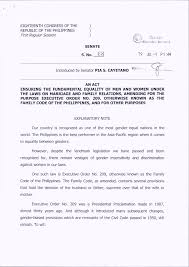The Family Code of the Philippines

The Family Code of the Philippines is an all-encompassing legal code covering individuals and family relationships, such as marriage, legal separation and inheritance issues. Furthermore, this legislation encompasses basic property law.
Drafters of the Philippine Family Code were keenly aware of the challenges many families face; therefore, it was written with practicality and understanding for Filipino cultures in mind.
Marriage
Philippine Government Policies Emphasize Family Values | LGBT Inc. Philippine laws have long acknowledged and upheld family values, emphasizing its primary social institution status and supporting children’s wellbeing as core components. Furthermore, Filipino laws include provisions protecting minorities like LGBT community. Despite these efforts however, implementation challenges persist across all regions.
Religion plays an outsized role in LGBT lives. This cultural norm contributes to their stigmatization and discrimination while impacting both their self-acceptance and mental health.
Philippine law mandates that couples who wish to marry in the country submit a “certificate of legal capacity to contract marriage.” This certification affirms there are no legal impediments to their union. For now, however, Embassy will no longer accept appointments to notarize these affidavits and instead refer couples directly to local civil registrars – who accept affidavits instead of notarization appointments as part of this requirement.
Legal separation
Legal separation is a court case that allows spouses to live apart and manage their own affairs independently, although it does not officially end the marriage like annulment would do. Therefore, it’s essential that both options be understood thoroughly in order to choose which may best meet your situation.
Notably, public policy still favors absolute divorce; as a result, any decree of divorce obtained by a Filipino according to the laws of her former marriage country remains valid and binding in the Philippines.
The dissent argues that although Manalo initiated her divorce proceedings outside the Philippines, this does not diminish her status as a national. Even though the Court held that an absolute divorce violates public policy, this ruling did not deprive Manalo of an avenue for seeking an annulment – she can still apply before RTC under Family Code provisions to secure such relief.
Divorce
Divorce has long been an emotive topic in the Philippines. While many Filipinos support it, Catholic Church authorities remain steadfastly against divorce; consequently, Filipinos can only dissolve their marriage through legal separation or annulment procedures; although recent efforts to legalize divorce in the country have failed.
Before filing for divorce in the Philippines, it is vital to familiarise oneself with family law and its complex issues relating to inheritance and property rights. Furthermore, one should consider how the effects of a separation may impact children.
The RTC’s decision to deny Manalo recognition of her foreign divorce is error because it contradicts this Court’s disposition in Nullada and other cases it has cited. Article 26(2) was designed to prevent Filipinos from circumventing an express prohibition against absolute divorce by invoking foreign laws as an avenue.
Annulment
The Family Code of the Philippines is an expansive legal document covering fields of great public importance. Its chapters address such matters as marriage requirements and grounds, property relations laws between partners in conjugal marriages, rules for filiation procedures and more. Furthermore, there are laws related to divorce and annulment included within its pages.
Filing for an annulment typically occurs at the Regional Trial Court in the province in which the marriage took place, where this court will carefully consider it and issue its verdict. When filing, petitioners must demonstrate why an annulment should occur and all arguments will be heard both pro and con for this action.
No matter whether the Philippines enacts divorce laws, its drafters clearly had practicality and understanding of Philippine culture in mind when creating this code. Without such legislation in place, wives of abusive partners or sexual addicts who abuse their wives would still be trapped in their marriages without legal recourse; their only recourse would be hyphenating their maiden surname with that of their husbands but only once their husbands have died or the Report of Marriage has been filed successfully.
